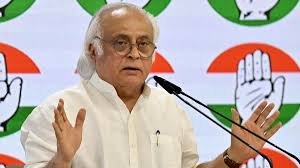‘RSS never accepted Constitution’: Congress slams Dattatreya Hosabale’s ‘should socialist, secular stay in Preamble’ remark

RSS General Secretary Dattatreya Hosabale has stirred a fresh political storm. At an event marking the 50th anniversary of the Emergency, he questioned whether the words “socialist” and “secular” still belong in the Preamble of the Indian Constitution. These words were added in 1976 during the Emergency, via the 42nd Constitutional Amendment.
Hosabale claimed that these terms were not part of the original Constitution drafted by Dr. B.R. Ambedkar. He argued that their insertion lacked a proper democratic process. “Should we not debate their relevance today?” he asked. He also demanded that Congress apologize for the Emergency-era excesses like mass arrests, press censorship, and forced sterilizations.
Congress Fires Back: “RSS Never Accepted the Constitution”
The Indian National Congress wasted no time in responding. Party leader Jairam Ramesh strongly criticized Hosabale’s remarks. He said the RSS had “never accepted the Constitution” since it was adopted in 1949. Ramesh reminded the public that RSS leaders had long opposed the vision of Ambedkar and Nehru.
Ramesh also referred to a key Supreme Court judgment from November 2024. The court upheld the inclusion of “socialist” and “secular” in the Preamble. According to the ruling, Parliament has the power to amend the Preamble as long as it doesn’t alter the Constitution’s basic structure. “The court has spoken. The matter is settled,” Ramesh declared.
He added that RSS and BJP leaders had openly spoken of replacing the Constitution during the 2024 general elections. Voters rejected that idea, he said. He called the current controversy a coordinated attempt to undermine Indian democracy.
A Historical Look at the Preamble Debate
The 42nd Amendment, passed in 1976, added the terms “socialist,” “secular,” and “integrity” to the Constitution’s Preamble. Critics argue that this happened during a time of limited public and parliamentary debate. However, legal scholars and several court judgments have since recognized these terms as valid.
The Supreme Court’s 2024 decision affirmed that these additions do not violate the Constitution. Instead, it said they reflect values already present in the document’s spirit. The court stated that secularism and social justice align with the goals of the Indian republic.
Even though Dr. Ambedkar did not explicitly include these words, he often spoke in support of these ideals. His speeches and writings show that he believed in a secular, equal, and socially just India.
What This Debate Really Means
This controversy is not just about words. It touches the core of India’s national identity. The RSS believes that “secular” and “socialist” reflect foreign ideologies. They argue that these words don’t fit the Indian civilizational context. In contrast, Congress and many other parties believe these terms are essential to Indian democracy.
“Secular” ensures that the state does not favor any religion. “Socialist” signals a commitment to reducing inequality and protecting the poor. Removing these terms, critics say, could open the door to majoritarianism and economic exclusion.
The Constitution stands as a promise to every Indian. It guarantees equality, liberty, and justice. Changing that promise, even symbolically, would be more than a legal edit. It would reshape India’s direction.
Political Signals and Public Reactions
The timing of Hosabale’s remarks is significant. Several states are preparing for elections. Both Congress and BJP are trying to shape the national narrative. The RSS seems to be testing how far they can go with their long-standing ideological goals. Meanwhile, Congress is using this moment to rally voters who value secularism and equality.
This debate will likely intensify in the coming weeks. Civil society groups, legal experts, and media commentators are already weighing in. Many warn that such moves could weaken the inclusive spirit of the Constitution.
A Test for India’s Democratic Values
The Constitution of India is not just a legal framework. It is a vision of a diverse, equal, and free society. The current controversy brings back an old question: What kind of nation does India want to be?
If “socialist” and “secular” are removed from the Preamble, it could shift public policy and national priorities. It could also impact the protection of minorities and the role of religion in governance. These are not small matters. They touch the daily lives of millions.
In times of growing polarization, defending the Constitution becomes a duty for all—leaders, citizens, and institutions alike.






